高二英语下学期Unit 2
- 格式:doc
- 大小:63.50 KB
- 文档页数:5
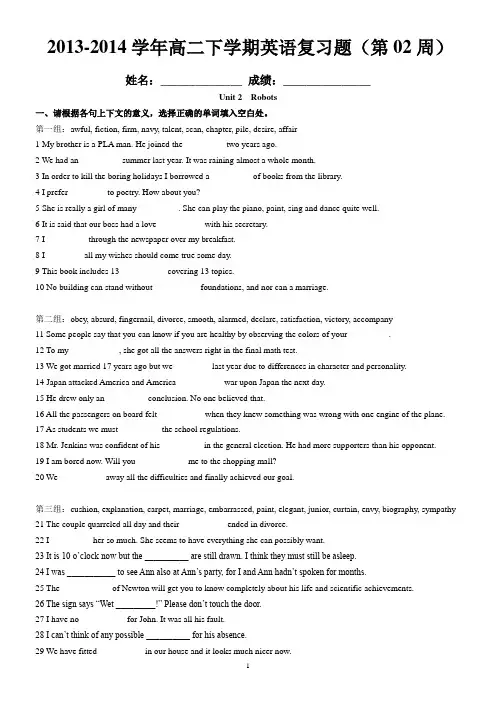
2013-2014学年高二下学期英语复习题(第02周)姓名:______________ 成绩:_______________Unit 2 Robots一、请根据各句上下文的意义,选择正确的单词填入空白处。
第一组:awful, fiction, firm, navy, talent, scan, chapter, pile, desire, affair1 My brother is a PLA man. He joined the _________ two years ago.2 We had an _________ summer last year. It was raining almost a whole month.3 In order to kill the boring holidays I borrowed a _________ of books from the library.4 I prefer ________ to poetry. How about you?5 She is really a girl of many _________. She can play the piano, paint, sing and dance quite well.6 It is said that our boss had a love __________ with his secretary.7 I _________ through the newspaper over my breakfast.8 I ________ all my wishes should come true some day.9 This book includes 13 __________ covering 13 topics.10 No building can stand without __________ foundations, and nor can a marriage.第二组:obey, absurd, fingernail, divorce, smooth, alarmed, declare, satisfaction, victory, accompany11 Some people say that you can know if you are healthy by observing the colors of your _________.12 To my ___________, she got all the answers right in the final math test.13 We got married 17 years ago but we ________ last year due to differences in character and personality.14 Japan attacked America and America __________ war upon Japan the next day.15 He drew only an _________ conclusion. No one believed that.16 All the passengers on board felt __________ when they knew something was wrong with one engine of the plane.17 As students we must _________ the school regulations.18 Mr. Jenkins was confident of his _________ in the general election. He had more supporters than his opponent.19 I am bored now. Will you ___________ me to the shopping mall?20 We __________ away all the difficulties and finally achieved our goal.第三组:cushion, explanation, carpet, marriage, embarrassed, paint, elegant, junior, curtain, envy, biography, sympathy21 The couple quarreled all day and their __________ ended in divorce.22 I _________ her so much. She seems to have everything she can possibly want.23 It is 10 o’clock now but the __________ are still drawn. I think they must still be asleep.24 I was ___________ to see Ann also at Ann’s party, for I and Ann hadn’t spoken for months.25 The ___________ of Newton will get you to know completely about his life and scientific achievements.26 The sign says “Wet _________!” Please don’t touch the door.27 I have no __________ for John. It was all his fault.28 I can’t think of any possible __________ for his absence.29 We have fitted __________ in our house and it looks much nicer now.30 After graduation from a _________ middle school, he went to a local senior middle school.31 The chair is so hard, but you will feel much more comfortable if you put a _________ on it.32 The lady looks prettier with an ________ dress on.二、把下列短语填入每个句子的空白处(注意所填短语的形式变化)-------------------------------------------------------------------------test out ring up turn around leave…alone set aside-------------------------------------------------------------------------1 Squirrels are considered to be good animals, for they can _________ nuts and foods in the trees for winter use.2 You may ___________ Mr. Chow either on Saturday or Sunday. He is available at the weekend.3 I _________ and suddenly found my Chinese teacher standing behind me.4 I hope you just ________ him _______. He needs time to have a rest.5 The robot is going to be __________ to see if it can really do the housework.二、用方框内所给短语的适当形式填空leave sb. alone/turn around/test out/set aside/ring up/smooth away1. How many people while I was out?2. The model must before we put it into mass production.3. , I saw an old friend of mine, whom I haven’t seen for years.4. She is very upset. for a few minutes.5. It’s time for us our differences and work together for a common purpose.6. There are still a few problems to be before we can complete the project.三、同义句转换1. I had never expected that I would get a Christmas present.A Christmas present was that I had I had expected.2. Thanks to your help, I succeeded in finishing my task in time.Thanks to your help, I finish my task in time.3. The thing that surprised me most was to see the village peo ple sitting quietly in our classroom.me most was the village people were sitting quietly in our classroom.4. Every year in China, people keep a day with the purpose of honoring and showing respect for the elders. Every year in China, a day is to honor and show respect for the elders.5. She shut herself in the room so as not to be disturbed.She shut herself in the room she might not be disturbed.四、完成句子1.你不能对他的承诺太当真,他从不遵守诺言You can not __________ his promise __________ __________,he never keep his word2.你迟到的原因是什么What is your ___________ ___________being late?3.起关键的不是你来自哪里,而是你的工作能力____________ is not where you come from but the ability to do the job __________ matters4.凯特不只是作家,更准确来讲,她是位工人作家Kate is __________ __________ a writer, ___________ ___________ she is a worker and writer5.他的朋友都羡慕他的新工作和好运气His friends all __________ him ____________ his new job as well as his good fortune .五、汉译英1尽管她已经二十多岁了,她的行为象小孩似的(as if )2你最好不理会他,当他为这样的事愤怒时(leave …alone )3我已经告诉你了我是认真对待的(take ….serious ly)4他一到达非州就给朋友打了个电话(ring …up )5.让他满意的是,他的儿子成功地通过了考试(satisfaction)六、完形填空Once a man came to a wise (智慧的) man’s house and said, “I have many 1 habits. Which one of them should I 2 first?” The wise man said, “Never tell lies and always speak the truth.” The man 3 to do so and went home.At night, the man was about to go out to steal. Before 4 , he 5 for a moment about the 6 he made to the wise man. “If he asks me where I have been, what shall I say? Shall I say I went out stealing? No, I can’t say that. But nor can I lie. If I tell the truth, everyone will start 7 me and call me a thief. I would be 8 for stealing.” So the man decided not to 9 that night, and gave up this bad habit.Next day, he wanted to drink wine. He was 10 to do so when an idea stopped him. “What shall I say to the wise man if he asks me what I did during the day? I can’t tell a lie.” And so he dropped the idea of drinking wine.11 , whenever the man thought of doing something bad, he remem bered his promise to tell the truth 12 . One by one, he gave up 13 his bad habits and became a very good person.Telling the truth is a very good habit. If you always speak the truth, you can 14 yourself from a lot of trouble and become a person everyone likes and favors.Make a promise: I 15 always speak the truth.1. A. good B. bad C. well D. nice2. A. give out B. give off C. give up D. give in3. A. decided B. promised C. settled D. agreed4. A. setting out B. putting out C. giving out D. looking out5. A. stopped B. remembered C. thought D. forgot6. A. answer B. reply C. words D. promise7. A. hating B. catching C. disliking D. recognizing8. A. noticed B. hurt C. ignored D. punished9. A. steal B. rob C. take D. carry10. A. thought B. plan C. about D. expected11. A. In a way B. In this way C. In many ways D. On the way12. A. at times B. in time C. at all times D. at a time13. A. some B. any C. all D .a few14. A. save B. take C. bring D. draw15. A. may B. have to C. need D. shall七、语法填空AUntil recently daydreaming was viewed as a waste of time. Or it ___1_______(consider) an unhealthy escape from real life and its duties. But now some people are taking a fresh look at daydreaming. Some think it may be a very ______2_____ (health) thing to do. Some researchers are finding that daydreaming may be important to mental health. Daydreaming, they tell us,_____3___(be) a good means of relaxation. But its benefits go 4 this. A number of psychologists have conducted experiments and have reached some 5 (surprise) conclusions.Dr. Joan T. Freyberg has concluded that daydreaming contributes to intellectual growth. It ____6_____ improves 7 (concentrate), attention span, and the ability to get along with others. Industrialist Henry J. Kaiser believed that much of his success was due to the positive use of daydreaming. Florence Nightingale dreamed of becoming a nurse. The young Thomas Edison pictured 8 as an inventor. For these notable achievers, it appears 9 their daydreams came true. Dr. Harry Emerson Fosdick offered this advice: “hold a picture of yourself… in your mind’s eye, and you will be drawn toward it. Picture yourself 10 as defeated and that alone will make victory impossible.BWill _____1____ matter if you don’t take your breakfast? Recently a test _____2_____ (give) in the United Sates. Those tests included people of different _____3_____ from 12 to 83. During the experiment, these people were given all kinds of breakfasts, and sometimes they got ______4______ breakfast at all. Special tests were set up to see ______5_____ well their bodies worked and when they had eaten _______6_____ certain kind of breakfast. The results show that if a person eats a proper breakfast, he or she will work with better effect _____7______ if he or she has no breakfast. This fact appears to be ______8______ (especial) true if a person works _____9____ his brains. For example, if a student eats fruit, eggs, bread and milk before going to school, he will learn more quickly and listen with _____10____ (much) attention in class.参考答案一、请根据各句上下文的意义,选择正确的单词填入空白处。
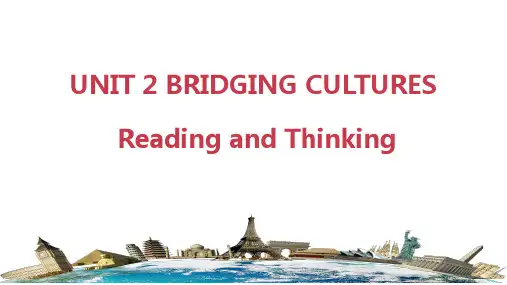
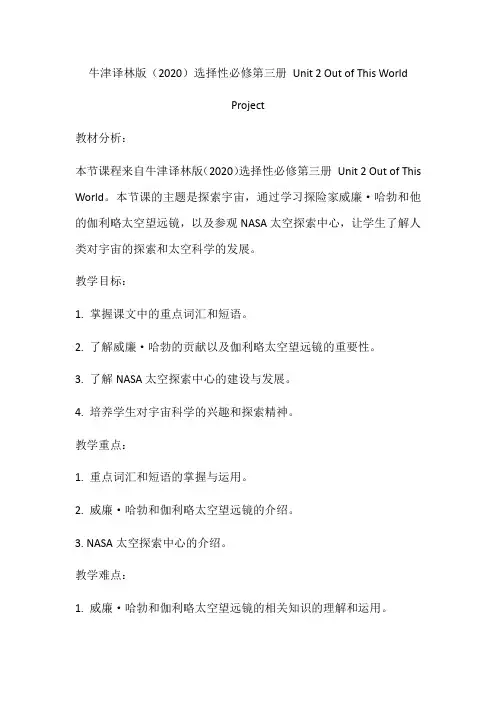
牛津译林版(2020)选择性必修第三册Unit 2 Out of This WorldProject教材分析:本节课程来自牛津译林版(2020)选择性必修第三册Unit 2 Out of This World。
本节课的主题是探索宇宙,通过学习探险家威廉·哈勃和他的伽利略太空望远镜,以及参观NASA太空探索中心,让学生了解人类对宇宙的探索和太空科学的发展。
教学目标:1. 掌握课文中的重点词汇和短语。
2. 了解威廉·哈勃的贡献以及伽利略太空望远镜的重要性。
3. 了解NASA太空探索中心的建设与发展。
4. 培养学生对宇宙科学的兴趣和探索精神。
教学重点:1. 重点词汇和短语的掌握与运用。
2. 威廉·哈勃和伽利略太空望远镜的介绍。
3. NASA太空探索中心的介绍。
教学难点:1. 威廉·哈勃和伽利略太空望远镜的相关知识的理解和运用。
2. 学生对NASA太空探索中心的建设与发展的理解和探讨。
学情分析:学生是高二年级的学生,已经具备一定的英语基础。
他们对科学和宇宙有一定的兴趣,但对相关知识了解可能较为有限。
学生可能对威廉·哈勃和伽利略太空望远镜的故事和NASA太空探索中心的发展有浓厚的兴趣,希望能通过这节课进一步了解。
教学策略:1. 引导学生观看相关视频和图片,激发学生的兴趣。
2. 组织小组讨论和合作学习,促进学生之间的互动和合作。
教学方法:1. 师生互动教学:教师以讲解和引导的方式,让学生主动参与课堂讨论。
2. 合作学习:通过小组合作和小组讨论的方式,让学生共同学习和分享。
导入环节(约5分钟):导入活动:通过展示一张风景画或者播放一个与太空相关的短视频来引起学生的注意。
导入内容:引入本节课的主题——太空。
导入活动:教师可以请学生观察画面或者视频中的元素,并提出以下问题进行导入:1. 你认为这是什么地方?2. 你对外星生物有什么了解?3. 你有过类似的太空梦吗?描述一下。
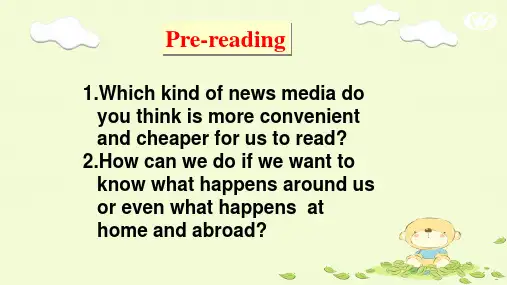
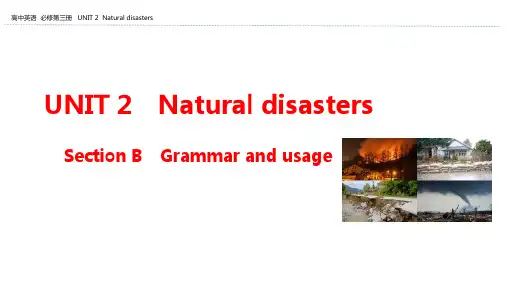
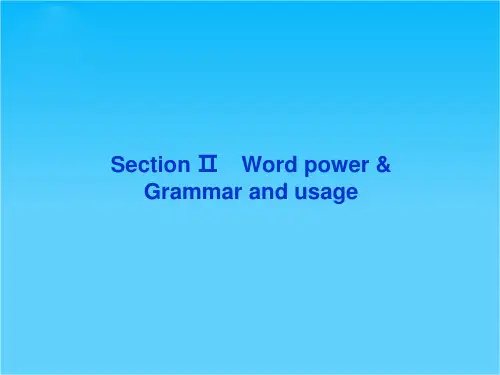
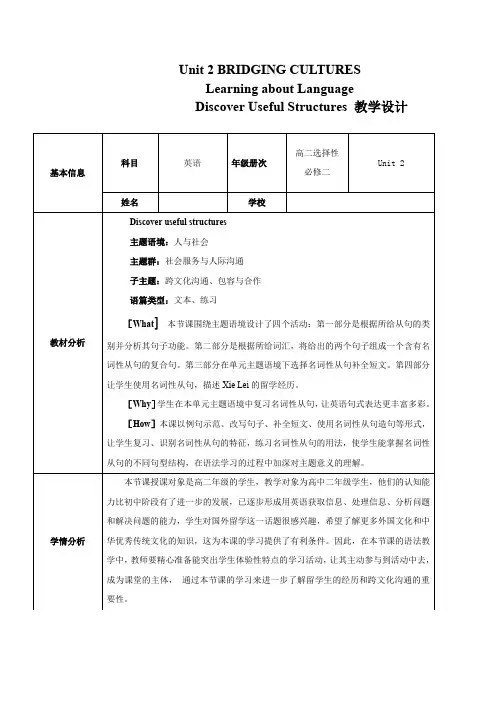
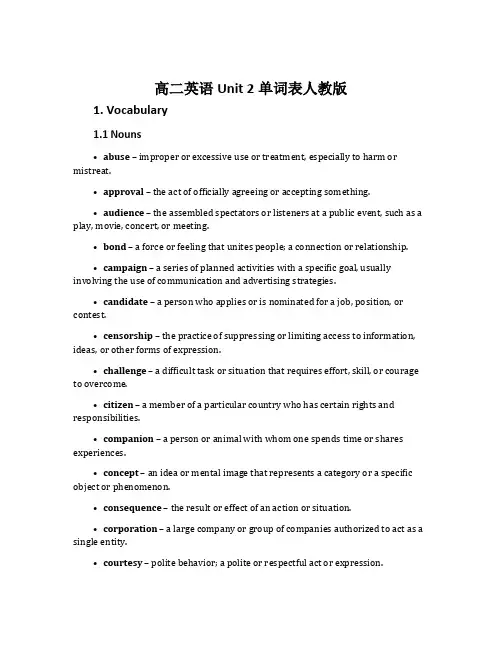
高二英语Unit 2单词表人教版1. Vocabulary1.1 Nouns•abuse– improper or excessive use or treatment, especially to harm or mistreat.•approval– the act of officially agreeing or accepting something.•audience– the assembled spectators or listeners at a public event, such as a play, movie, concert, or meeting.•bond– a force or feeling that unites people; a connection or relationship.•campaign– a series of planned activities with a specific goal, usually involving the use of communication and advertising strategies.•candidate– a person who applies or is nominated for a job, position, or contest.•censorship– the practice of suppressing or limiting access to information, ideas, or other forms of expression.•challenge– a difficult task or situation that requires effort, skill, or courage to overcome.•citizen– a member of a particular country who has certain rights and responsibilities.•companion– a person or animal with whom one spends time or shares experiences.•concept– an idea or mental image that represents a category or a specific object or phenomenon.•consequence– the result or effect of an action or situation.•corporation– a large company or group of companies authorized to act as a single entity.•courtesy– polite behavior; a polite or respectful act or expression.•criticism– the act of expressing disapproval or pointing out faults or shortcomings.•cyberbullying– the use of electronic communication to bully or harass someone, typically through social media platforms or electronic messaging.•deed– an action or accomplishment.•discipline– a system of rules or regulations for behavior.•distraction– a thing that prevents someone from concentrating on something else.•documentary– a nonfictional film or television program that presents factual information about a subject.•editorial– an article or opinion piece in a newspaper or magazine that reflects the views or policies of its editor or publisher.•emotional– relating to feelings or emotions.•equality– the state of being equal in status, rights, and opportunities.•ethical– relating to moral principles or standards.•evidence– facts, information, or data that supports a claim or argument.•exploitation– the action or fact of treating someone unfairly in order to benefit from their work or resources.•fault– responsibility for a mistake or wrongdoing.•freedom– the power or right to act, speak, or think as one wants without hindrance or restraint.•generation– all of the people who were born and lived around the same time.•harassment– aggressive pressure or intimidation, often repeated, that causes discomfort or distress.•harm– physical or mental injury or damage.•hope– a feeling of expectation or desire for a certain thing to happen.•identity– the qualities, beliefs, personality, and expressions that make a person who they are.•ignorance– lack of knowledge or information.•immigration– the action of coming to live permanently in a foreign country.•independence– the state of being free from outside control or support.•individual– a single person, as opposed to a group or society.•influence– the capacity to have an effect on the character, development, or behavior of someone or something.•injustice– the lack or violation of fairness or justice.•inspiration– the process of being mentally stimulated to do or feel something creative or worthwhile.•joy– a feeling of great pleasure or happiness.•justice– the quality of being fair and just.•knowledge– information, skills, or awareness gained through experience, education, or study.•leadership– the action of leading a group of people or an organization.•legacy– something that is handed down or remains from a previous generation or time.•liberty– the state of being free within society from oppressive restrictions.•lifestyle– the way in which a person or group lives and the values and attitudes they have.•maturity– the state of being fully developed or grown.•media– the main means of mass communication, such as newspapers, magazines, television, or the internet.•morality– principles concerning the distinction between right and wrong or good and bad behavior.•opinion– a view or judgement formed about something, not necessarily based on fact or knowledge.•opposition– resistance or dissent, expressed in action or argument.•outcast– a person who has been rejected or excluded by society or a social group.•parallel– a person or thing that is similar or analogous to another.•peace– freedom from disturbance; tranquility.•perspective– a particular attitude or way of viewing something.•petition– a formal written request, typically signed by many people, appealing to authority with respect to a particular cause.•platform– a raised level surface on which people or things can stand.•pollution– the presence in or introduction into the environment of substances or things that have harmful or poisonous effects.•prejudice– preconceived opinion or bias, usually unfavorable, formed without adequate knowledge, reason, or thought.•priority– the fact or condition of being regarded or treated as more important.•reality– the state of things as they actually exist, as opposed to an idealistic or notional idea of them.•reputation– the beliefs or opinions that are generally held about someone or something.•responsibility– the state or fact of having a duty to deal with something or someone.•rights– the legal or moral entitlements that individuals possess.•scandal– an action or event regarded as morally or legally wrong and causing general public outrage.•scarcity– the state of being in short supply; shortage.•self-esteem–confidence in one’s own worth or abilities; self-respect.•shadow– a dark area or shape produced by a body coming between rays of light and a surface.•silence– complete absence of sound; quiet.•society– the aggregate of people living together in a more or less ordered community.•stereotype– a widely held but fixed and oversimplified image or idea of a particular type of person or thing.•storytelling– the activity of telling or writing stories.•support– the action of giving assistance, encouragement, or approval to someone or something.•technology– the application of scientific knowledge for practical purposes, especially in industry.•tension– mental or emotional strain or excitement.•tradition– the transmission of customs or beliefs from generation to generation.•tribute– an act, statement, or gift that is intended to show gratitude or respect.•victim– a person who is deceived or cheated, typically by others.•victory– an act of defeating an enemy or opponent in a battle, game, or other competition.•violence– behavior involving physical force intended to hurt, damage, or kill someone or something.•volunteer– a person who freely offers to do something or to assist in some way.•warning– a statement or event that warns of something or that serves as a cautionary signal.•wealth– a large amount of money or valuable possessions.•wisdom– the quality of having experience, knowledge, and good judgement.1.2 Verbs•achieve– successfully bring about or reach (a desired objective or result) by effort, skill, or courage.•argue– give reasons or cite evidence in support of an idea, action, or theory, typically with the aim of persuading others to share one’s view.•explore– travel through (an unfamiliar area) in order to learn about it or familiarize oneself with it.•impact– have a strong effect on someone or something.•participate– take part or become involved in an activity or event.•persuade– cause (someone) to do something through reasoning or argument.•respect– admire (someone or something) deeply, as a result of their abilities, qualities, or achievements.•reveal– make (previously unknown or secret information) known to others.•strengthen– make or become stronger.•unite– come or bring together for a common purpose or action.1.3 Adjectives•active– engaging or ready to engage in physically energetic pursuits.•alert– quick to notice any unusual and potentially dangerous or difficult circumstances; vigilant.•anonymous– not identified by name; of unknown name.•balanced– having different elements in the correct proportions.•changeable– liable to change or vary; alterable.•compassionate– feeling or showing sympathy and concern for others.•consistent– acting or done in the same way over time, especially so as to be fair or accurate.•creative– relating to or involving the use of the imagination or original ideas to create something.•curious– eager to know or learn something.•fair– treating people equally without favoritism or discrimination.•flexible– capable of bending or being bent without breaking.•honest– free of deceit and untruthfulness; sincere.•influential– having great influence on someone or something.•intelligent– having or showing intelligence, especially of a high level.•powerful– having great power or strength.•resilient– able to withstand or recover quickly from difficult conditions.•responsible– having an obligation to do something, or having control over or care for someone, as part of one’s job or role.•selfless– concerned more with the needs and wishes of others than with one’s own; unselfish.•valuable– worth a lot of money or considered to be important or useful.2. ConclusionThis vocabulary list includes a wide range of nouns, verbs, and adjectives related to Unit 2 of the high school English textbook published by Renjiao Publishing. These words cover various topics such as society, relationships, ethics, activism, media, and more. Familiarizing oneself with these words will prove helpful in understanding the unit’s content and engaging in disc ussions or activities related to the unit’s themes. It is essential to remember that effective language learning involves not only memorizing vocabulary but also using it in context to develop language skills.。
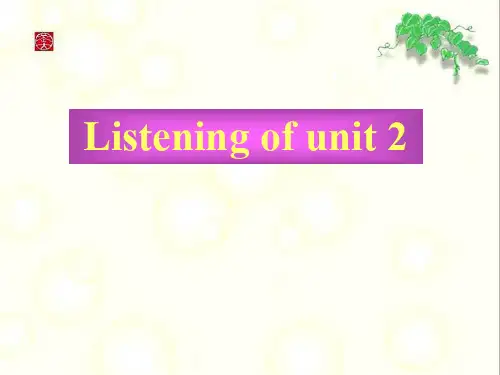
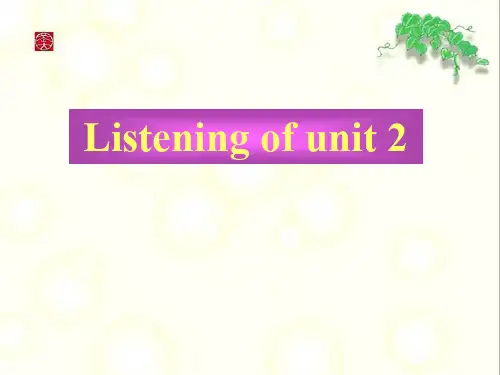
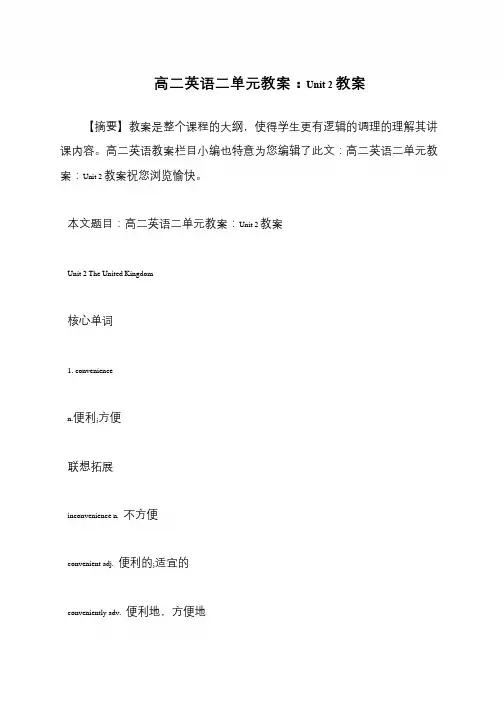
Unit 21. deliver (v.)(1) 发表(讲话,演讲)to deliver/ give/ make a speech 发表演说(2) 投递,送(货)A postman is a man employed to deliver letters and parcels. 邮差就是雇来投递信件及包裹的。
delivery (n.) 送货,投递,交付,分娩2. think of…as… = regard…as…以为,认为……;把……看作……Y ou mustn’t think of me as being unhappy. 你不可认为我不开心。
They regarded him as a fool. 他们认为他是个傻瓜。
3. integration (n.) [U] 结合,综合;融合the integration of manual and mental labour 体力劳动与脑力劳动的结合integrate (v.) 整合,结合A integrates with B. A与B结合起来integrate theory with practice 理论联系实际4. involve (v.) 牵涉,牵连;需要The investigate involved many innocent people. 这次调查牵涉了许多无辜者。
5. stance (n.)[C] 姿势,态度,立场,姿态What’s your stance on this policy? 你对这项政策持什么态度?He altered his stance slightly and leaned against a tree. 他稍微改了一下姿势,倚在一棵树上。
6. have a good control of sth. 对……很好地控制/ 掌握When we deliver a speech, we should have a good control of the presentation speed.当我们发表演讲时,我们应很好的掌握演讲速度。
Important words and phrases of Unit 2A:重点单词1. differ vi.观察示例:In pairs, look at these pictures and discuss which ones are natural clones and which ones are man-make. Explain how they differ.两人一组, 观察图片并讨论哪些是自然无性繁殖, 哪些是人工的。
解释它们的区别。
H er method doesn’t differ much from mine. 她的方法跟我的没有很大不同。
Modern airplanes differ from early ones. 现代飞机跟早期的在很多方面有所不同。
I differ with him I how to solve the problem. 对于如何解决问题, 我跟他的意见不一致。
They differ with each other on moral standards. 关于道德标准, 他们的见解不同。
differ是不及物动词, 主要有两个义项:“不同, 相异;不同意, 意见相左”。
常见的搭配有:1). sb. differ from/with sb. on/about sth.;2). sth. and sth. differ in… ;3). sth. differ from sth .用介词from, with, on, about, upon 或in 填空。
(1) We differ from, with him on, about, upon that question.(2) The two nations differ __ culture and religion. (in)(3) The climate here differ _________ that of the South. (from, with)2. undertake vt.观察示例:The procedure is difficult to undertake, of course. 当然, 这个过程很难实施。
The scientist undertakes the experiment. 科学家从事这项实施。
I can undertake the responsibility for the changes. 我愿意承接这项变革的案子。
The lawyer undertook a new a new case. 那个律师接了一个新的案子。
undertake是及物动词, 主要有两个义项: 着手做, 从事, 进行; 担任, 承担, 答应, 同意。
(1) He will _________ __ _______ next month (去旅行). (undertake a journey)(2) He __________ __ ____ ____ (承担一项新任务). (undertake a new task)3. disturbing adj.观察示例:Then came disturbing news that Dolly became seriously ill. 然后传来了多莉得了重病的令人烦恼的消息。
The news from the front is very disturbing. 来自前线的消息令人极为不安。
disturb vt. 扰乱, 使不安, 弄乱;disturbed adj. 被扰乱的, 动乱的, 不安的;disturbing adj. 令人不安的。
特别提示: 现在分词表示: 令人怎么样, 过去分词表示: 被使得怎么样, 感到怎么样。
如: an interesting story 令人感兴趣的故事an interested look 感到兴趣的表情surprised people (感到)惊奇的人们用disturb, disturbing,填空。
(1) I’m very _________ about Alice. (disturbed)(2) Don’t _______ the papers on my desk. (disturb)(3) This country is in a _________ state. (disturbing)(4) What _________ news it is! (disturbing)(5) A light wind _________ the surface of the water. (disturbed)4. object v.objection n.观察示例:On the other hand , Dolly’s appearance raised a storm of objections and had a great impact on the media and public imagination. 另一方面, 多莉的出现引来了巨大的反对激发了传媒的热炒和公众的想像力。
I feel a strong objection to getting up early. 我极不愿意早起。
Have you any objection to my opening the window? 你反对我打开窗子吗?My main objection to the plan is that it costs too much. 我反对该计划的主要理由是它费用太高。
vi. We object to being treated like this. 我们抗议这种待遇。
I object to the plan. 我反对这项计划。
I object that he is too young to take that position. 我提出反对意见:他太年轻不适合那个职位。
object 作不及物动词时后接介词to或against. 作及物动词时可接that引导的从句。
objection是名词,常与have, take, feel 等连用构成词组:have objection to take objection to feel objection to句型转换(1) Have you any objection to my opening the window? = Would you ______ __ my opening the window?(object to)(2) take objection to smoking. = I ______ __ smoking. (object to)(3) “But he is too young,” she argued. = She ________ that he was too young. (objected)5. forbid vt.观察示例Governments became nervous and many forbade research into human clothing.政府开始感到不安, 有许多政府禁止对克隆的研究。
Smoking should be forbidden in public places. 公共场所应禁止吸烟。
Her father forbid her to go out alone. 她父亲不许她单独外出。
I forbid you entering my study. 我不许你进入我的书房。
forbid 是不及物动词, 常见的搭配有:forbid + sth.doing sth.sb. to do sth.sb. doing sth.sb. sththat(1) The school forbid the students to smoke (禁止学生吸烟).(2) He is forbidden to enter the room (进入这个房间).6. accumulate观察示例:vt.Some countries such as China and the UK continued to accumulate evidence of the abundant medical aid that cloning could provide. 有些国家比如中国和英国继续收集克隆能提供丰富的医疗帮助的证据。
He accumulated fortune by hard work. 他因努力工作而积蓄了一笔财富。
The purpose of education is not just accumulating information. 教育的目的不仅仅是积累知识。
vi . Dust accumulated during my absence. 我不在期间灰尘积聚了起来。
accumulate可作及物动词和不及物动词,表示:收集,聚集,堆积。
另外accumulation n. 积聚如: the accumulation of knowledge 知识的积聚1) He quickly accumulated large fortune (积蓄了一大笔财富).(2) Clouds began to accumulate in the sky (在天空中聚集).7. retire vi.观察示例:He retired at the age of 65. 他65岁退休。
He will soon retire from the army. 他不久将退役。
The men went on talking while the ladies retired. 男人们继续交谈, 而女士们退到了客厅。
She retired early that night. 那天晚上她就寝得早。
retire 作不及物动词时有两个义项:退役, 退职;退出,退后,从餐厅回到客厅, 就寝(较go to bed正式)。
(1) He worked as a guard after _______ ____ ___ _____ (退役). (retiring from the army)(2) The troops ______ _____ ___ ____ (从战地退了回来). field n. 战地(retired from the field)8. bother观察示例:vt.However, the problem that she later developed a serious lung disease bothered scientists.但是, 她后来得了严重的肺病这个问题让科学家们感到烦恼。